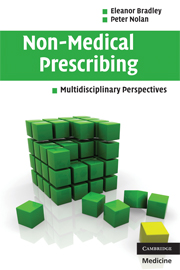Book contents
- Frontmatter
- Contents
- List of contributors
- Foreword
- Preface
- Acknowledgements
- Introduction
- 1 Medicines and prescribing – past and present
- 2 Nurse prescribing – impact, education and sustainability
- 3 Nurse prescribers: from 2003 to 2006
- 4 Nurse prescribing experienced
- 5 Nurse prescribing observed
- 6 Pharmacists and prescribing
- 7 Professions allied to medicine and prescribing
- 8 Conclusions
- Index
- References
4 - Nurse prescribing experienced
Published online by Cambridge University Press: 22 August 2009
- Frontmatter
- Contents
- List of contributors
- Foreword
- Preface
- Acknowledgements
- Introduction
- 1 Medicines and prescribing – past and present
- 2 Nurse prescribing – impact, education and sustainability
- 3 Nurse prescribers: from 2003 to 2006
- 4 Nurse prescribing experienced
- 5 Nurse prescribing observed
- 6 Pharmacists and prescribing
- 7 Professions allied to medicine and prescribing
- 8 Conclusions
- Index
- References
Summary
This chapter focuses on the direct experiences of nurses who successfully completed the prescribing course and set about establishing their prescribing role in practice. The data were derived from postal questionnaires and semi-structured in-depth interviews conducted with nurses working in different environments, specialities and different team formations. Not all visualised the prescribing role in the same way, and this appears to have been dictated by their own perceptions of what they understood non-medical prescribing to be, what their employers expected of them on completion of the course and what they were permitted to do in the services in which they worked. Some had elected to combine supplementary and independent prescribing, while others were working exclusively as either supplementary or as independent prescribers. Approximately a third of the sample anticipated that prescribing would enable them to develop their practice by managing their own caseloads, initiating new ways of working and running nurse-led clinics; others hoped that prescribing would help them reduce the amount of time patients had to wait to be seen and the bureaucracy that accompanies making appointments.
Starting out as a prescriber: overcoming anxiety
Recognising the many dimensions of nurse prescribing and the multiple ways in which it affected nurses, one nurse commenting on her new role summed it up as ‘It's a sort of growing up experience’.
- Type
- Chapter
- Information
- Non-Medical PrescribingMultidisciplinary Perspectives, pp. 73 - 88Publisher: Cambridge University PressPrint publication year: 2008



